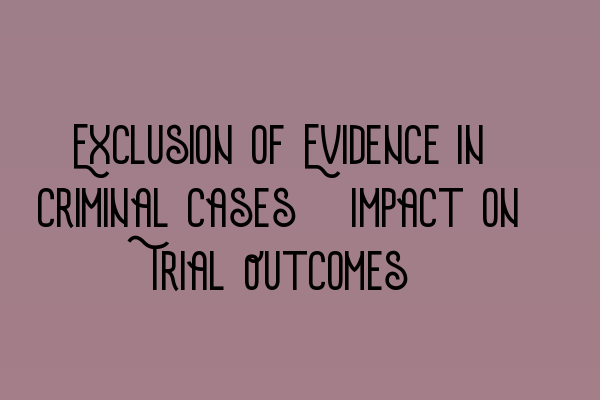Exclusion of Evidence in Criminal Cases: Impact on Trial Outcomes
In criminal cases, evidence plays a vital role in establishing guilt or innocence. However, not all evidence is admissible in court. The exclusion of evidence can have a significant impact on trial outcomes and, ultimately, the fairness of the criminal justice system.
When evidence is excluded, it means that the jury or judge cannot consider it when making their decision. This can occur for various reasons, such as a violation of the defendant’s rights, unreliable or tainted evidence, or misconduct by law enforcement or other parties involved in the case. The purpose of excluding evidence is to ensure that only reliable and lawfully obtained evidence is considered in determining the truth.
One of the most common grounds for excluding evidence is a violation of the defendant’s constitutional rights, specifically the Fourth (search and seizure) and Fifth (self-incrimination) Amendments. If evidence is obtained through an illegal search or seizure, such as without a warrant or probable cause, it may be deemed inadmissible. Similarly, if a defendant’s confession or statement is obtained involuntarily or without the presence of counsel, it may be excluded from trial.
Exclusion of evidence can also occur due to issues of reliability. For example, if the prosecution presents forensic evidence that is based on flawed or outdated scientific techniques, the defense can challenge its admissibility. Similarly, evidence that is obtained through coercion, manipulation, or unreliable witnesses may be excluded from consideration. This ensures that the evidence presented before the court is accurate and trustworthy, safeguarding the integrity of the trial process.
Furthermore, the exclusion of evidence can occur when there is misconduct by law enforcement or other individuals involved in the case. This can include tampering with evidence, fabricating or falsifying evidence, or failing to disclose exculpatory evidence to the defense. The court may exclude such evidence to prevent unfair prejudice or to maintain the principles of justice and fairness.
So, how does the exclusion of evidence impact trial outcomes?
Firstly, it can significantly weaken the prosecution’s case. If key evidence is excluded, the prosecution may struggle to prove the defendant’s guilt beyond a reasonable doubt. This can result in a weakened case, potentially leading to acquittal or a lesser conviction.
Secondly, the exclusion of evidence can affect the defense strategy. Defense attorneys often rely on challenging the admissibility or credibility of evidence to cast doubt on the prosecution’s case. When evidence is excluded, it limits the defense’s ability to challenge the prosecution’s assertions, making it easier for the prosecution to secure a conviction.
Overall, the exclusion of evidence strikes a balance between protecting individual rights and ensuring a fair trial. It prevents the use of improperly obtained or unreliable evidence while maintaining the integrity of the criminal justice system. However, it also has the potential to impact trial outcomes, favoring either the prosecution or the defense depending on the circumstances.
At SQE Criminal Law & Practice Law UK, we understand the importance of evidence in criminal cases and the impact its exclusion can have on trial outcomes. Our team of experienced solicitors is dedicated to staying abreast of the latest developments in criminal law and providing quality legal representation to our clients.
If you are preparing for your SQE exams or considering a career in criminal law, we offer SQE 1 and SQE 2 preparation courses that can help you succeed. Additionally, if you are looking for practice exam questions or mocks, we have a wide range of resources available, such as our SQE 1 Practice Exam Questions and SQE 1 Practice Mocks FLK1 FLK2 articles.
Stay informed about the SRA SQE exam dates by checking our regularly updated article on the topic. We strive to provide valuable insights and resources to help you excel in your legal career.
Don’t let the exclusion of evidence catch you off guard – equip yourself with the knowledge and skills necessary to navigate the complexities of criminal law. Contact SQE Criminal Law & Practice Law UK today to learn more about our courses and resources.
